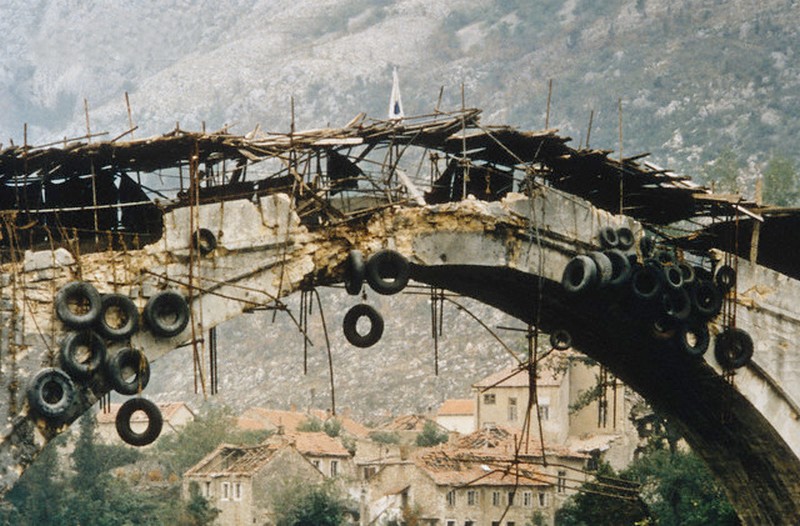You have /5 articles left.
Sign up for a free account or log in.
We typically imagine identity-based conflict as fire – think of the burning towers of religious extremism.
But, as Robert Frost reminded us, if you are talking about the end of the world – or at least civilization as we know it - ice will do just as well.
I thought about that poem when I read this piece in the New York Times about the city of Mostar. The iconic Mostar Bridge has been rebuilt, but the divided mentality of the city remains.
The iconic Mostar Bridge has been rebuilt, but the divided mentality of the city remains.
Though formally at peace, in the sense that there is no active conflict, there is an icy divide in the city that gives me the chills a continent and an ocean away. The schools, the nightclubs, the athletic leagues, even the fire brigades of Mostar are all split down religious lines. If there is a fire on the Muslim side of town, the Catholic fire brigade will not respond.
Is it crazy to think that this is where we in America might be heading?
On my visits to college campuses, I will occasionally encounter student groups who proudly claim that they will not work – or even talk – with one another because of an ideological difference often rooted in group identity.
Here is the scenario that I present to these students: let’s say you are a heart surgeon and you get scheduled for a two-person life-saving heart surgery tomorrow. As you are prepping the case, you find out that the doctor you are scheduled to work with is from that other identity group and they believed differently than you on the Middle East or marriage equality or immigration policy or some such fundamental matter (and all of these matters are indeed fundamental). Would you try to get out of performing the surgery?
Ok, now let’s walk it down the chain. Would you refuse to be on a Parent Teacher Association with someone who voted differently than you in 2016? Would you coach Little League with that person? Would you take your kids off a baseball team if that other person was the coach?
In Mostar, apparently they would.
The great genius of American society is that identity groups build civic associations that serve everyone. Consider the hospitals and social service agencies in your town. I bet you over half have religious roots. I bet very few refuse to admit people from other faiths.
In my mind, the most striking example of this dynamic is in the world of higher education. At least half of the private colleges and universities in the United States were started by religious communities, and remarkably few restrict admission to their own group. I am in this country because a university started by French Catholic priests in the hinterlands of Indiana admitted a wayward Muslim immigrant from India to its MBA program in the 1970s. That man, my father, always marveled that Notre Dame, founded for the formation and advancement of young Catholic men, expanded its mission to include the success of others, and was respectful of their diverse identities along the way.
For me, the higher education example is illustrative on multiple fronts.
The first is the insight contained in the story above – institutions created to form people within one tradition now commonly serve as platforms that bring together and advance people from a range of traditions. This is a remarkable fact, and one that we ought to both cherish and celebrate. We have found an avenue for the expression of religious identity in a way that doesn’t create Balkanization but instead facilitates bridging social capital.
The second front is that our higher ed institutions, precisely because they highlight how particular identities can welcome diversity, are also in a position to teach - and help students practice - the art of strengthening particular identity while also building bridges across groups. This is what I love most about effective interfaith work – it makes you a better Muslim (theologically speaking) when you build houses with Catholics, it helps the people who need the houses, and it strengthens the civic fabric of our diverse society along the way.
Finally, diverse societies are especially in need of reasoned judgment rather than constant outrage, precisely because identity-based conflicts, whether hot or cold, are so easy to ignite. In a recent Wall Street Journal piece, Lance Morrow wrote that organizing a lynch mob is easier than conducting a fair trial. The former stokes the base emotions that all human beings have; the latter requires maturity and judgment.
Social media is a terrain of dry brush easily set aflame by outrage. Higher ed should be where cooler heads warmed by loving hearts prevail.

